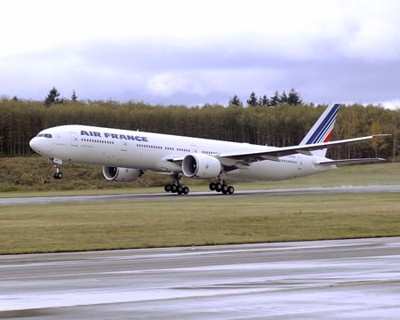Mon, Feb 08, 2010
Finds "Strong Financial Incentives" For Use Of Alternative
Fuel
 EQ2, which
describes itself as "a sustainability economics company," released
a report Thursday examining the development of sustainable,
carbon-neutral biofuels for aircraft, and a critical study of the
economic and climate impacts of the aviation industry as it moves
towards the large-scale adoption of biofuels. The report finds the
industry's reliance on fossil fuels has caused it to become
extremely vulnerable to changes that will go into effect in 2012,
when the EU Emissions Trading Scheme applies to all flights into or
out of Europe, and puts a direct cost on its carbon emissions.
EQ2, which
describes itself as "a sustainability economics company," released
a report Thursday examining the development of sustainable,
carbon-neutral biofuels for aircraft, and a critical study of the
economic and climate impacts of the aviation industry as it moves
towards the large-scale adoption of biofuels. The report finds the
industry's reliance on fossil fuels has caused it to become
extremely vulnerable to changes that will go into effect in 2012,
when the EU Emissions Trading Scheme applies to all flights into or
out of Europe, and puts a direct cost on its carbon emissions.
With a predicted 15% and 30% consumption of biofuel in 2020 and
2030, the report predicts the EU aviation industry will be able to
avoid 35 million tons of CO2 emissions in 2020 and 100 million tons
in 2030. Such a reduction in emissions is equivalent to $2.01 in
savings on carbon expense in 2020, and $5.84 billion in 2030. Based
on the same assumption of aviation biofuel consumption, the global
aviation industry could be able to avoid 129 million tons of CO2
emissions in 2020, and up to 420 million tons in 2030.
The report's findings show strong financial incentives, based on
the current EU Emissions Trading Scheme price for carbon in 2012 of
$20.50, and 2009 average jet fuel price of $1.69 per gallon, every
gallon of jet fuel burned would incur carbon costs of an additional
$0.21, which is a total cost of $1.34 billion across the industry.
Projecting to 2020 and 2030, the industry will face carbon costs of
$9.56 billion and $19.48 billion, respectively. This is a
premium that would not apply to carbon-neutral biofuel, which will,
the report says, help make it more cost competitive.

"The aviation industry must embrace the new realities
surrounding climate change," said Steve Burt, CEO of EQ2. "Our
report demonstrates the clear benefits of adaptation, with
renewable fuel being the current best option the industry has
against future economic and regulatory pressures."
More News
Airport Marking Aids Markings used on runway and taxiway surfaces to identify a specific runway, a runway threshold, a centerline, a hold line, etc. A runway should be marked in ac>[...]
"It is extremely difficult, if not impossible, for manned aircraft to see a drone while conducting crop-enhancing and other aerial applications at low altitudes and high speeds. We>[...]
Aero Linx: The Skyhawk Association The Skyhawk Association is a non-profit organization founded by former Skyhawk Pilots which is open to anyone with an affinity for the A-4 Skyhaw>[...]
“The T-54A benefits from an active Beechcraft King Air assembly line in Wichita, Kansas, where all required METS avionics and interior modifications are installed on the line>[...]
Aero Linx: Aerostar Owners Association The Association offers the Aerostar Owner a unique opportunity to tap an invaluable source of information concerning the care and feeding of >[...]
 ANN's Daily Aero-Term (04.28.24): Airport Marking Aids
ANN's Daily Aero-Term (04.28.24): Airport Marking Aids Aero-News: Quote of the Day (04.28.24)
Aero-News: Quote of the Day (04.28.24) ANN's Daily Aero-Linx (04.28.24)
ANN's Daily Aero-Linx (04.28.24) Aero-News: Quote of the Day (04.29.24)
Aero-News: Quote of the Day (04.29.24) ANN's Daily Aero-Linx (04.29.24)
ANN's Daily Aero-Linx (04.29.24)




